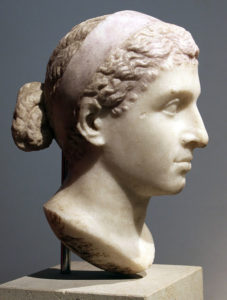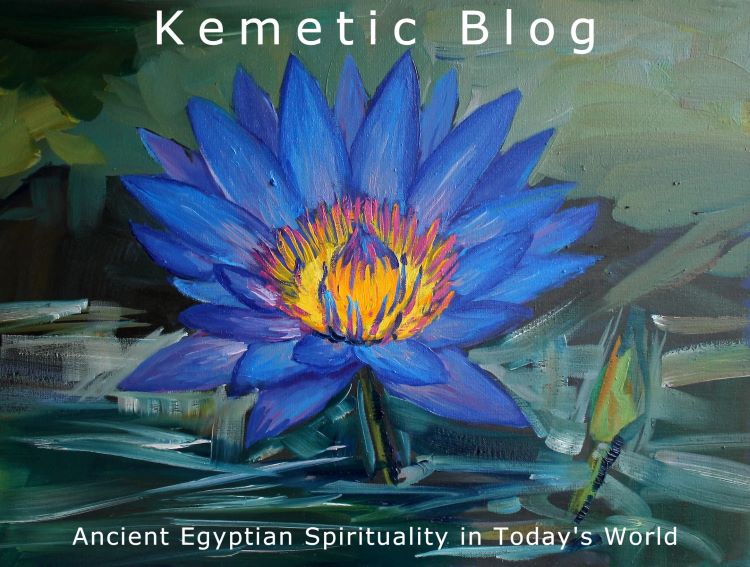
The Berlin Cleopatra, a Roman bust of Cleopatra VII with a royal diadem (40-30 BC), Altes Museum. This file is licensed under the Creative Commons Attribution 3.0 Unported license via Wikipedia. Image by Sailko.
Welcome back to part two of my discussion on Queen Cleopatra.
In part one I addressed the controversy surrounding Cleopatra’s race and our attitudes toward racism. There were some uncomfortable truths put out there for your consideration, which I hope were thought-provoking. I wanted to give readers a pagan perspective, but also a peace-loving perspective and share ideas that I haven’t seen written or spoken about anywhere else. That alone is a concern. Shouldn’t peace be a top priority?
Because I would’ve thought we learned something from past atrocities which occurred during the last century or two or three; that we remained vigilant in regard to sowing the seeds of more intolerance and hate in the world. My hope is that we’re only momentarily confused. Distracted, if you will. The root cause of these proposed distractions, and possible solutions, are topics I’d like to cover in Part 2.
To do that, let’s shift into the metaphysical aspects of reality. I mentioned previously that I’d been avoiding Queen Cleopatra VII for a few years, and it had nothing to do with her race. This is the post I’ve been dying to write! My higher soul has been singing to me this entire time:
Let’s get metaphysical, metaphysical
I wanna get metaphysical
Let’s get into metaphysical
Let me hear your souls talk, your souls talk!
I hope there’s no copyright issues there. Sorry, Olivia. I had to do it. Much love and respect to you (speaking of which, although Olivia Newton-John is sadly no longer with us in the physical — pun intended — she has a new lyric video out for True to Yourself, featuring Vanessa Amorosi).
Alright, so Queen Cleopatra VII appeared to me in visions (or Subjective Mystical Experiences) on a few occasions within my first year of becoming a Kemetic pagan. Her story was so immense, her presence so overwhelming and her death such a disaster for ancient Egypt, that I had to push her away. I simply wasn’t ready to take on and process everything she was going to show me. It was just too much for me to bear, however it didn’t mean I didn’t care! I did care and I wanted to help wherever I could. If one person processes collective trauma, it becomes possible for the next. And so the situation felt like a storm suspended over the horizon. If I went into that storm, I wanted to be certain I could get out the other side.
To my astonishment, a similar insight was touched upon by Professor Shelley P. Haley in the Queen Cleopatra documentary. The professor mentioned she did not pursue Queen Cleopatra VII right away in her career and was more or less avoiding her story. That’s when I nearly leapt from my seat with confirmation, it’s not just me. It’s not just Professor Hayley. It’s virtually everyone! We’ve all been avoiding the real Queen Cleopatra.
Perhaps I’m playing amateur psychologist (and I acknowledge the irony of that, given many of my more supernatural claims) but it’s become obvious to me, that we’ve been avoiding a collective ancient trauma regarding the death of Queen Cleopatra VII and the loss of ancient Egypt. We’ve created a massive drama about race — which is a contemporary problem, not an ancient problem — as a distraction. Sooner or later, everyone who loves ancient Egypt will need to come to terms with its loss and the grief that’s awaiting us.
Do you remember the first time you saw the 1997 film, Titanic? I’m assuming you’ve seen it. If not, just recall the first time you had your heart broken and that should suffice. Try to remember the deep-seated emotional response either of those two experiences gave you. That’s similar to the vibe you should be getting when you watch Queen Cleopatra, but it’s not, is it? Instead, we’ve been having a meltdown over her race.
Think about it, this was a disastrous event in which an entire civilisation went down, with Queen Cleopatra VII at the helm, and it was never the same again. Not long after the Romans conquered Egypt, Abrahamic religions rolled in; the last pagan temple at Philae was closed in AD 537, and it was all but curtains for ancient Egypt and its traditional religion. From a Kemetic pagan perspective, these events are worthy of perpetual lamentation, whether you’re a pagan or not. But we’re not lamenting, at least not directly.
If we continue down the line of Elisabeth Kübler-Ross, I think most of us are stuck in denial and anger. As for myself, I love a good bargain. I can’t help but think, where would we be today if ancient Egyptian civilisation had continued to endure, if Queen Cleopatra VII had survived and the religion, language, and culture of ancient Egypt still flourished today? We would undoubtedly live in a vastly different world, a world that would have been kinder to women, to people of all races, to the LGBTIQ+ community and I think that list could be expanded (but it exceeds my current knowledge-base).
While ancient Egypt was not a perfect utopia by any means, its loss was surely a setback for humanity. That’s the even bigger tragedy — an invisible tragedy — that surrounds us today. It wasn’t some primitive, semi-barbaric civilisation that became obsolete, withered and died. It was something infinitely more precious than that, and it was taken from us. That’s why we lash out at each other, that’s why everyone wants a piece of it and claims ownership of it, and that’s why everyone’s fighting and flocking to re-discover it. We lost something, and we’re trying to get it back.
Part of my life as a Kemetic pagan is to envision what that world would be like, and to live it as best I can in my present circumstances. To me, that’s what being a Kemetic pagan is all about. I think ancient Egypt would have continued to grow and evolve, which would have brought definite change but the foundations, like the underpinning philosophy of Ma’at and a religion rooted in polytheism would have remained the same (despite a few monotheistic rebels, like Akhenaten who I speculate, may have achieved a transpersonal state of oneness or non-duality and that’s where the concept of having One God might have come from, but again, I am simply a lay person, not an academic or Egyptologist).
The common thread appearing to connect our collective modern trauma with our ancient trauma are the effects of colonialism and the enslavement of human beings. This is what we need to work on healing. Arguing about it, spewing diatribe online, doesn’t solve anything. Moving forward, I think it’s important not to dismiss or discount the ideas, beliefs and opinions of other people. Historical evidence can often be interpreted in many different ways and is not always as definitive as we’d like it to be. Maybe Cleopatra had some black heritage, maybe she didn’t. We don’t know for certain, which means we should accept and embrace either potential outcome as a possibility. Her story is a part of our story, the human story, that’s what matters most.
I might mention briefly, that the current second lady of New York State, Lacey Schwartz Delgado made a documentary of her own called, Little White Lie that aired on PBS in 2015. Growing up as a Jewish girl in a white neighbourhood, Lacey had a somewhat darker complexion that her parents always attributed to having a Sicilian Jewish grandfather. Still, uncertainty gnawed at her and when it came time to apply for college, she left the racial identity box unticked on her college application form. She was later admitted as an African American student based on her photograph. Later, feeling encouraged and empowered by her black friends, Lacey confronted her parents and learned the truth, that her biological father was, in fact, a light-skinned African American man who her mother had formed a relationship with. It’s very easy to be in denial, for the truth of a person’s identity to be hidden in plain sight. Was Cleopatra’s a similar story? Some believe it’s a firm yes, some a firm no and some are open to possibilities. I prefer to be in the latter category, not because it’s safe but rather, sensible.
What I can say with certainty, is that hate divides us. When we’re divided, we’re already conquered. Then we’re going nowhere, without any hope of meaningful dialogue. Respect for one another and developing a tolerance for beliefs that differ from our own is the only way we’re going to heal the rifts and move on. If we all have a love for ancient Egypt, then why not have a love for one another, as well?
Thank you, for reading Kemetic Blog. Please subscribe, share on social media and leave your thoughts in the comment section below!

Acknowledgement of African Origin The author of Kemetic Blog acknowledges and respects the African ancestral origins of ancient Egypt and recognises the practice of Kemetic paganism as a modern reflection of Traditional African Religion.
©Scott Rose / Kemetic Blog – All Rights Reserved.

No Comments